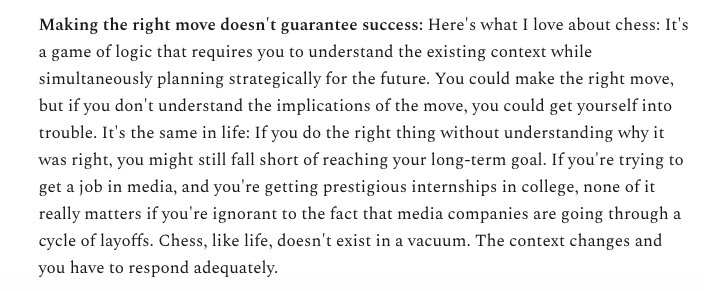
Chess is psychological warfare, and Magnus Carlsen thrives in the chaos. He doesn't beat his opponents outright, but his style feels more like a "strangling pressure."
Carlsen, 30, became the second youngest world chess champion in 2013.
This is his story 👇👇👇
Carlsen, 30, became the second youngest world chess champion in 2013.
This is his story 👇👇👇

As a kid, Carlsen showed an aptitude for intellectually stimulating games.
Before he was 2, he was able to complete a 50-piece jigsaw puzzle by himself.
By age 4, he had memorized the names and the population size of most of Norway's 430 municipalities.
Before he was 2, he was able to complete a 50-piece jigsaw puzzle by himself.
By age 4, he had memorized the names and the population size of most of Norway's 430 municipalities.
At age eight, Carlsen's father re-introduced him to the game of chess.
After playing for a year, Magnus beat his dad for the first time in a game of blitz chess, and he started to play in local junior competitions shortly thereafter.
After playing for a year, Magnus beat his dad for the first time in a game of blitz chess, and he started to play in local junior competitions shortly thereafter.

Carlsen had an exceptional memory, and he would sharpen his skills by playing by himself for hours—moving pieces around, searching for combinations & replaying games and positions.
In 2001, Carlsen's family hired Norway's top player, grandmaster Simen Agdestein, to coach Carlsen
In 2001, Carlsen's family hired Norway's top player, grandmaster Simen Agdestein, to coach Carlsen
At a 2004 tournament in Reykjavik, Carlsen beat Anatoly Karpov, the former champion, in a game of blitz chess.
A month later, Carlsen became a grandmaster at age 13, making him the second youngest in history.
At 30 years old, Magnus Carlsen is the current World Chess Champion.
A month later, Carlsen became a grandmaster at age 13, making him the second youngest in history.
At 30 years old, Magnus Carlsen is the current World Chess Champion.
In this video, Carlsen and Bill Gates play a game of blitz chess.
It took Carlsen 1 minute and 19 seconds to defeat Gates.
It was a total of nine moves to checkmate. "Oh that was quick," Gates says, as he leans back in his chair.
It took Carlsen 1 minute and 19 seconds to defeat Gates.
It was a total of nine moves to checkmate. "Oh that was quick," Gates says, as he leans back in his chair.
There's a lot that chess can teach you about life.
Here's one thing that I've learned from studying Magnus:
Here's one thing that I've learned from studying Magnus:

• • •
Missing some Tweet in this thread? You can try to
force a refresh







